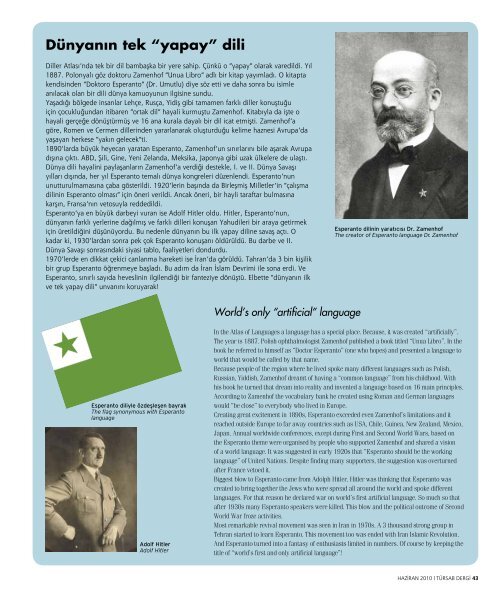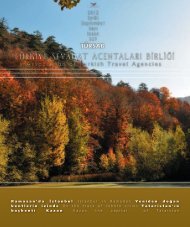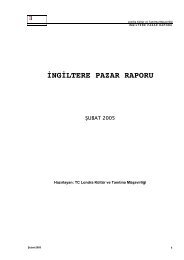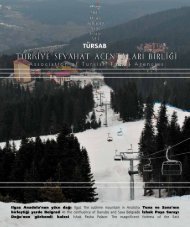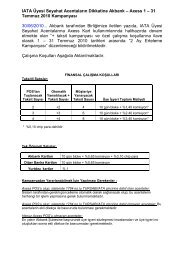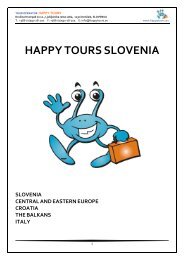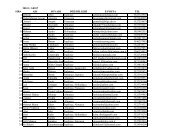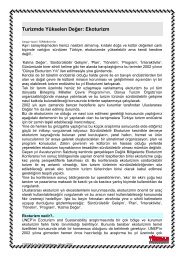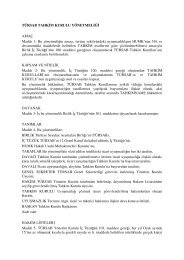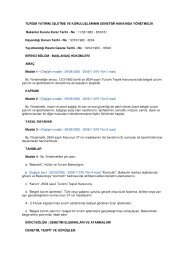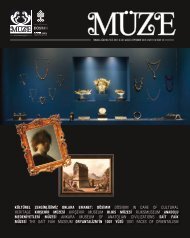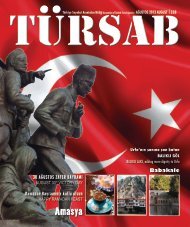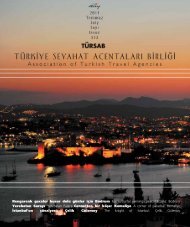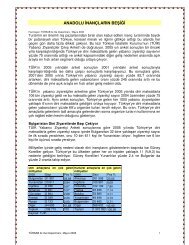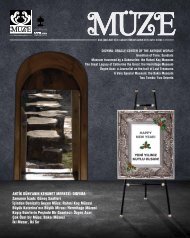‹çindekiler Contents - Türkiye Seyahat Acentaları Birliği
‹çindekiler Contents - Türkiye Seyahat Acentaları Birliği
‹çindekiler Contents - Türkiye Seyahat Acentaları Birliği
You also want an ePaper? Increase the reach of your titles
YUMPU automatically turns print PDFs into web optimized ePapers that Google loves.
Dünyanın tek “yapay” diliDiller Atlası’nda tek bir dil bambaşka bir yere sahip. Çünkü o “yapay” olarak varedildi. Yıl1887. Polonyalı göz doktoru Zamenhof “Unua Libro” adlı bir kitap yayımladı. O kitaptakendisinden “Doktoro Esperanto” (Dr. Umutlu) diye söz etti ve daha sonra bu isimleanılacak olan bir dili dünya kamuoyunun ilgisine sundu.Yaşadığı bölgede insanlar Lehçe, Rusça, Yidiş gibi tamamen farklı diller konuştuğuiçin çocukluğundan itibaren “ortak dil” hayali kurmuştu Zamenhof. Kitabıyla da işte ohayali gerçeğe dönüştürmüş ve 16 ana kurala dayalı bir dil icat etmişti. Zamenhof’agöre, Romen ve Cermen dillerinden yararlanarak oluşturduğu kelime haznesi Avrupa’dayaşayan herkese “yakın gelecek”ti.1890’larda büyük heyecan yaratan Esperanto, Zamenhof’un sınırlarını bile aşarak Avrupadışına çıktı. ABD, Şili, Gine, Yeni Zelanda, Meksika, Japonya gibi uzak ülkelere de ulaştı.Dünya dili hayalini paylaşanların Zamenhof’a verdiği destekle, I. ve II. Dünya Savaşıyılları dışında, her yıl Esperanto temalı dünya kongreleri düzenlendi. Esperanto’nununutturulmamasına çaba gösterildi. 1920’lerin başında da Birleşmiş Milletler’in “çalışmadilinin Esperanto olması” için öneri verildi. Ancak öneri, bir hayli taraftar bulmasınakarşın, Fransa’nın vetosuyla reddedildi.Esperanto’ya en büyük darbeyi vuran ise Adolf Hitler oldu. Hitler, Esperanto’nun,dünyanın farklı yerlerine dağılmış ve farklı dilleri konuşan Yahudileri bir araya getirmekiçin üretildiğini düşünüyordu. Bu nedenle dünyanın bu ilk yapay diline savaş açtı. Okadar ki, 1930’lardan sonra pek çok Esperanto konuşanı öldürüldü. Bu darbe ve II.Dünya Savaşı sonrasındaki siyasi tablo, faaliyetleri dondurdu.1970’lerde en dikkat çekici canlanma hareketi ise İran’da görüldü. Tahran’da 3 bin kişilikbir grup Esperanto öğrenmeye başladı. Bu adım da İran İslam Devrimi ile sona erdi. VeEsperanto, sınırlı sayıda heveslinin ilgilendiği bir fanteziye dönüştü. Elbette “dünyanın ilkve tek yapay dili” unvanını koruyarak!Esperanto dilinin yaratıcısı Dr. ZamenhofThe creator of Esperanto language Dr. ZamenhofWorld’s only “artificial” languageEsperanto diliyle özdeşleşen bayrakThe flag synonymous with EsperantolanguageAdolf HitlerAdolf HitlerIn the Atlas of Languages a language has a special place. Because, it was created “artificially”.The year is 1887. Polish ophthalmologist Zamenhof published a book titled “Unua Libro”. In thebook he referred to himself as “Doctor Esperanto” (one who hopes) and presented a language toworld that would be called by that name.Because people of the region where he lived spoke many different languages such as Polish,Russian, Yiddish, Zamenhof dreamt of having a “common language” from his childhood. Withhis book he turned that dream into reality and invented a language based on 16 main principles.According to Zamenhof the vocabulary bank he created using Roman and German languageswould “be close” to everybody who lived in Europe.Creating great excitement in 1890s, Esperanto exceeded even Zamenhof’s limitations and itreached outside Europe to far away countries such as USA, Chile, Guinea, New Zealand, Mexico,Japan. Annual worldwide conferences, except during First and Second World Wars, based onthe Esperanto theme were organised by people who supported Zamenhof and shared a visionof a world language. It was suggested in early 1920s that “Esperanto should be the workinglanguage” of United Nations. Despite finding many supporters, the suggestion was overturnedafter France vetoed it.Biggest blow to Esperanto came from Adolph Hitler. Hitler was thinking that Esperanto wascreated to bring together the Jews who were spread all around the world and spoke differentlanguages. For that reason he declared war on world’s first artificial language. So much so thatafter 1930s many Esperanto speakers were killed. This blow and the political outcome of SecondWorld War froze activities.Most remarkable revival movement was seen in Iran in 1970s. A 3 thousand strong group inTehran started to learn Esperanto. This movement too was ended with Iran Islamic Revolution.And Esperanto turned into a fantasy of enthusiasts limited in numbers. Of course by keeping thetitle of “world’s first and only artificial language”!HAZİRAN 2010 | TÜRSAB DERGİ 43


